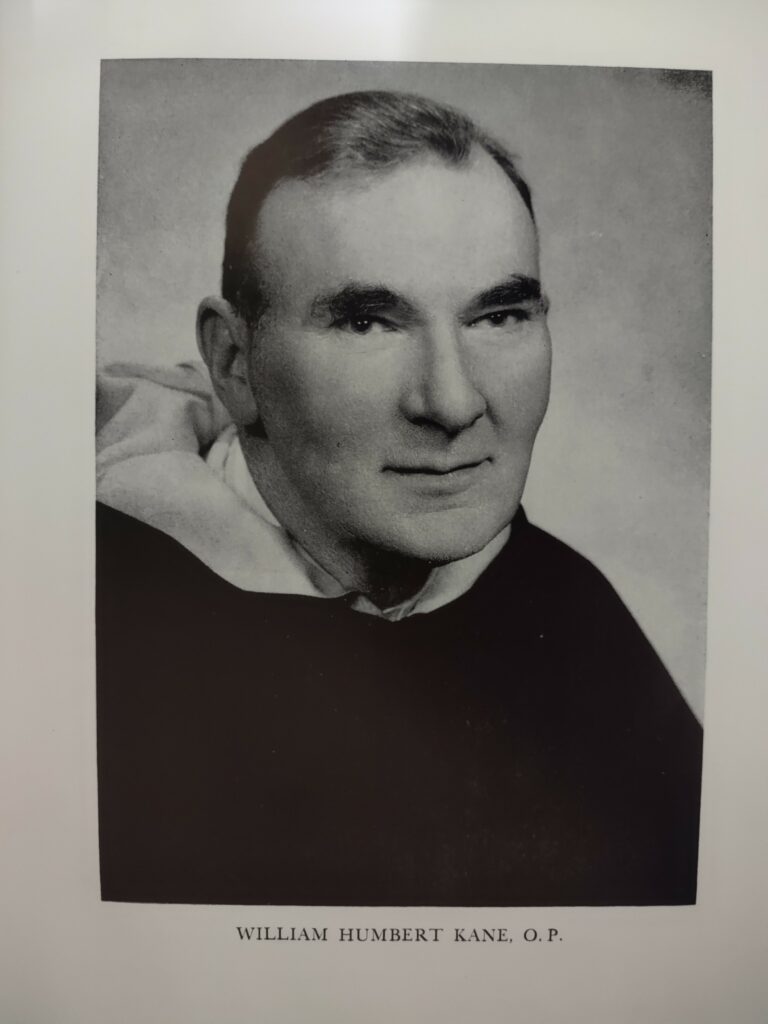
Fr. William Humbert Kane, O.P. was an alum of the Angelicum and a professor here for a short period who, inspired by the work of Rev. Aniceto Fernandez, O.P., founded the first Dominican institute dedicated to research in philosophy and modern science, the Albertus Magnus Lyceum in River Forest, Illinois, the seedbed of “River Forest Thomism”.
As a young Dominican in Washington, DC in the 1920s, he was preparing to join the missions in China as both a priest and a doctor. As such, in addition to his studies in theology at the Dominican House of Studies, he studied pre-medicine at the Catholic University of America (1923-1926) and medicine at Georgetown University (1926-1928). He was ordained to the priesthood in 1927 but his path to the missions was diverted and he was instead sent to the Angelicum in 1928, earning his Doctorate in Philosophy in 1930, writing on “Finality in Nature”. From there, he began his lifelong devotion to teaching and study, primarily at the Dominican House of Philosophy and later Studium, in River Forest, Illinois. Over the years he served as professor of philosophy, Lector Primarius, Regent of Studies, and President of the Pontifical Faculty of Philosophy, eventually earning the title Master in Sacred Theology in 1944.
Fr. Kane was always interested in the relationship between philosophy and contemporary science, from his own extensive studies in medicine and philosophy. Upon reading Fr. Fernandez’s work “Science and Philosophy according to St. Albert the Great” in 1936, he found the theoretical grounding for his own intuitions and became a vocal proponent of the need for a unified understanding of Thomistic natural philosophy and modern science. His work inspired many of his students and several American Dominicans embraced a similar passion. Fr. Kane returned to the Angelicum as a Professor of Philosophy from 1948-1951 and was very well received by the student, but at the same time momentum among the Dominicans of his province in the United States to found an institute dedicated to research in natural philosophy and modern science, the first of its kind for the Dominican Order.
In 1951, Fr. Kane returned to the United States to be the director of this new initiative, the Albertus Magnus Lyceum, housed at the Dominican studium in River Forest, Illinois. The Lyceum was founded on principles drawn from and extended from the work of Fr. Fernandez, that there is a proper unity to the study of nature pursued by philosophers and scientists, and that their work should mutually aid one another. For nearly two decades, the Albertus Magnus Lyceum was a collaborative effort of Dominicans from several countries and many non-Dominicans, including both philosophers and scientists, that pursued research, organized conferences and workshops, and argued for a coherent understanding of philosophy of science in a variety of publications. Their work touched on general questions of the history and philosophy of science, as well as specific work in physics, biology, and psychology. In addition they collaborated with various educational institutions and religious communities to develop ways of integrating philosophy and science in the curricula of elementary and high schools.
Today, much of the work of the Albertus Magnus Lyceum has been forgotten, but the principles it was founded on, and a number of related historical and philosophical ideas have come to be known collectively as “River Forest Thomism.” The most well known proponents of this “school” of Thomism were several of Lyceum’s prominent Dominican contributors, Fr. Benedict Ashley, O.P., Fr. Athanasius Weisheipl, O.P., and Fr. William Augustine Wallace, O.P. Unfortunately contemporary conversations about River Forest Thomist rarely get beyond the abstract philosophical disagreements they had with other more metaphysical “schools” of Thomism. As important as these foundational questions can be, it overshadows the broader goals for engagement with contemporary science laid out by Fr. Fernandez and Fr. Kane, and the actual positive collaborative work that the Lyceum achieved over its two decades of existence.
References:
Weisheipl, James, O.P. “Introduction: Dignity of Science” in Dignity of Science: Studies in the Philosophy of Science Presented in Honor of William Humbert Kane, O.P. (Washington, DC: Thomist Press, 1961), xvii-xxxiii.
